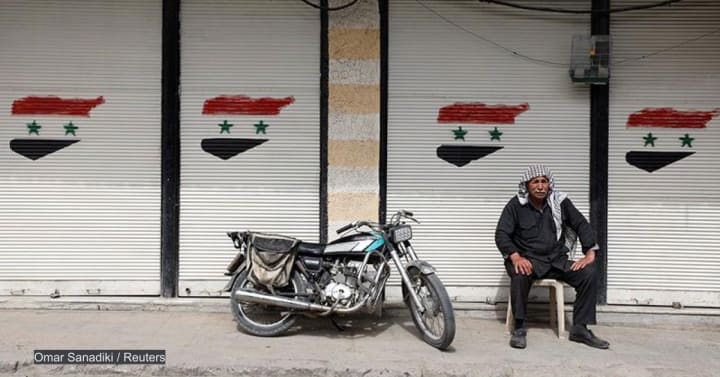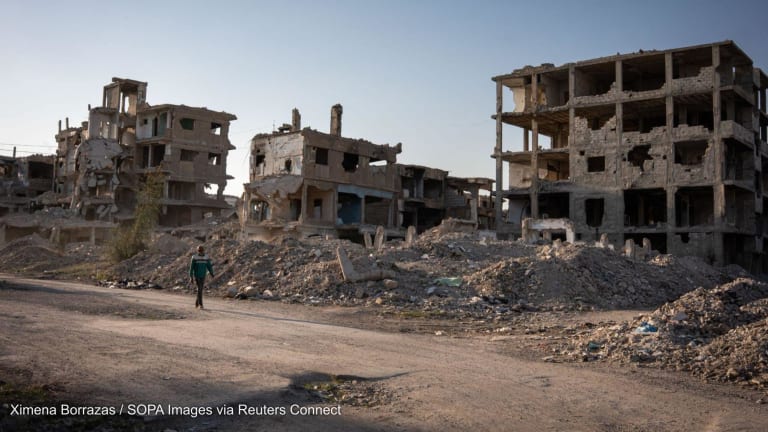
It has been 10 years since the start of the uprising in Syria. Over the last decade, hundreds of thousands of people have been killed by the conflict, many millions of Syrians have been displaced inside Syria or have become refugees, a generation of children has been left without access to education, and 12.4 million people lack access to sufficient food, according to the latest World Food Programme statistics.
It is hard to believe that a conflict so deadly and destructive is slipping out of the public awareness of the media and the world. But according to a recent poll by YouGov, only 58% of Britons surveyed said they knew that the war in Syria was still going on.
Prospects for peace in the country may seem small. But despite all of the challenges, there are forces for peace at work. These need to be supported in a sustained way. There is a strong civil society, in addition to committed individuals and organizations — both Syrian and non-Syrian — and concerted efforts to build a more peaceful and just future for Syrians.
There is patient, determined, detailed, and principled work underway, even though it does not often make the headlines. Over the past few years, for example, peace-building organization International Alert has been working with a transnational network of Syrian peace-building activists on economic recovery, inclusiveness within the peace process, and social cohesion between Syrians and host communities outside of Syria.
Peace-building work needs continued support and investment. Without this, many organizations are unable to deliver their work in communities.
—There is obviously a lot of work to be done, with a long road ahead and many uncertainties. But without a doubt, there are ways to work on peace-building, even while the violence continues — and even if there is little movement within the political process. For example, raising visibility and changing narratives on sensitive issues through public awareness campaigns and dialogue sessions are key.
This work can also extend into building and mobilizing alliances around critical issues such as women’s rights, justice and accountability, or youth participation in peace-building. Engaging with local, national, and international decision-makers through evidence-based advocacy efforts that break down barriers and help foster collaborative partnerships is important — as is creating localized spaces where action and dialogue can continue, even when the policy level is blocked.
This work is crucial to both addressing the conflict-affected people’s immediate needs and building the foundation for longer-term peace. From Alert’s own work, we know that there are some excellent initiatives that offer the space, time, and resources for people to process the war’s effects on their lives, regain their agency, and have their voices heard.
For some, participation in civic activism for peace-building has also been an opportunity to find an alternative to being engaged in violence. As one of the participants in a recent initiative for youth peace-building recently said: “Some of the people in our group were carrying guns in Syria. Today, they are sitting down with us and thinking of not using arms inside or outside. There are one or two people who were very extreme in religious terms and would not talk to others, but now they are sitting down and talking with these people.”
Syrians in Northwest wonder if renewed violence or virus will strike first
In northwestern Syria, a tenuous March 5 cease-fire is holding, and there are still no confirmed cases of COVID-19. Those facts conceal a far more dangerous reality.
Peace-building work needs continued support and investment. Without this, many organizations are unable to deliver their work in communities, unable to consistently respond to challenges, and cannot grow or maintain their impact in the long term. Even though donor funding is shrinking — in part due to cuts to aid budgets — donor governments must continue to support the work that is happening in and for Syria. This includes humanitarian, development, and peace-building work, all of which is interconnected and vital.
Peace-building needs action from all levels and all sides. It needs the inclusion and participation of all elements of society, even though this is sometimes challenging to achieve, given the logistical and security challenges that many Syrians face.
It also needs a commitment to justice and accountability, a strong and capable civil society, and investment in the health, well-being, and education of children and families, among other factors. Peace won’t come about if the powers that be don’t allow it to, and it won’t last if civil society and communities are not able to overcome the traumatic effects of war or are unable to be part of the process of creating and sustaining peace.
I know that speaking of prospects for peace does not make the profound loss endured by Syrians easier to bear. But it is, at least, a reason not to lose hope that progress toward peace can be made.




